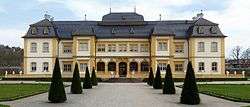Veitshöchheim
| Veitshöchheim | ||
|---|---|---|
|
Schloss Veitshöchheim | ||
| ||
 Veitshöchheim | ||
Location of Veitshöchheim within Würzburg district  | ||
| Coordinates: 49°49′58″N 9°52′54″E / 49.83278°N 9.88167°ECoordinates: 49°49′58″N 9°52′54″E / 49.83278°N 9.88167°E | ||
| Country | Germany | |
| State | Bavaria | |
| Admin. region | Unterfranken | |
| District | Würzburg | |
| Government | ||
| • Mayor | Jürgen Götz (CSU) | |
| Area | ||
| • Total | 10.76 km2 (4.15 sq mi) | |
| Population (2013-12-31)[1] | ||
| • Total | 9,736 | |
| • Density | 900/km2 (2,300/sq mi) | |
| Time zone | CET/CEST (UTC+1/+2) | |
| Postal codes | 97209 | |
| Dialling codes | 0931 | |
| Vehicle registration | WÜ | |
| Website | www.veitshoechheim.de | |
Veitshöchheim is a municipality in the district of Würzburg, in Bavaria, Germany. It is situated on the right bank of the Main, 6 kilometres (4 mi) northwest of Würzburg. In the town is Schloss Veitshöchheim; this summer palace of the Prince-Bishops of Würzburg was built in 1680–82, and was enlarged to its present appearance in 1753 by Balthasar Neumann. The gardens were redesigned for Prince-Bishop Adam Friedrich von Seinsheim (1755–1779), with lakes and waterworks, and filled with hundreds of allegorical sandstone sculptures from the workshops of the court sculptors Ferdinand Tietz and Johann Peter Wagner.
The town has a railway station near the Schloss with a former royal pavilion.
References
- ↑ "Fortschreibung des Bevölkerungsstandes". Bayerisches Landesamt für Statistik und Datenverarbeitung (in German). 31 December 2013.
External links
-
 Veitshöchheim travel guide from Wikivoyage
Veitshöchheim travel guide from Wikivoyage
|
This article is issued from Wikipedia - version of the Saturday, January 02, 2016. The text is available under the Creative Commons Attribution/Share Alike but additional terms may apply for the media files.

